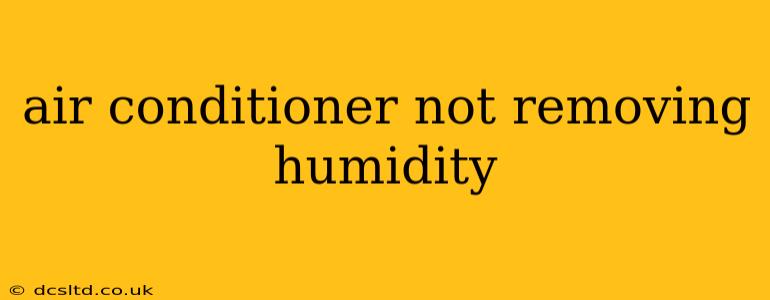Is your air conditioner struggling to remove humidity from your home, leaving you feeling sticky and uncomfortable despite the cool temperature? This is a common problem with several potential causes. This comprehensive guide will help you diagnose the issue and find effective solutions. Understanding why your AC isn't dehumidifying effectively is crucial for maintaining a comfortable and healthy indoor environment.
Why is My Air Conditioner Not Dehumidifying?
This is a question many homeowners grapple with. The answer often lies in a combination of factors, including the type of AC unit you have, its maintenance, and even the climate. Let's explore some key reasons:
1. Incorrect Thermostat Settings:
-
Problem: Many modern air conditioners operate more efficiently in "auto" or "fan" mode. If you've set your thermostat to "cool" with the fan constantly on, the unit might not be cycling properly, reducing its dehumidifying capabilities. This continuous cooling can lead to a less effective dehumidification process.
-
Solution: Switch your thermostat to "auto" mode. This allows the unit to cycle on and off, removing moisture more effectively than constantly running the fan. Ensure the temperature is set appropriately for your comfort level. Experiment with slightly raising the temperature to see if this increases dehumidification, as higher temperatures allow for longer cooling cycles.
2. Clogged Air Filter:
-
Problem: A dirty air filter restricts airflow, reducing the efficiency of your AC unit. This limitation prevents proper heat exchange, hindering its ability to remove moisture from the air.
-
Solution: Regularly inspect and clean or replace your air filter. A clean filter ensures optimal airflow and enhances the dehumidification process. Check your manufacturer’s guidelines for recommended filter replacement frequency – typically every 1-3 months, depending on usage.
3. Refrigerant Leaks:
-
Problem: Low refrigerant levels significantly impact the cooling and dehumidifying capacity of your air conditioner. A leak can drastically reduce the unit's ability to absorb moisture from the air.
-
Solution: This requires professional assistance. A qualified HVAC technician can identify and repair refrigerant leaks, restoring your air conditioner's full functionality. Attempting this repair yourself can be dangerous and may void your warranty.
4. Frozen Evaporator Coil:
-
Problem: A frozen evaporator coil is a serious issue that restricts airflow and significantly impairs both cooling and dehumidification. This is often due to restricted airflow (dirty filter, frozen drain line), low refrigerant, or a faulty fan motor.
-
Solution: Turn off your air conditioner and allow it to thaw completely. Clean the air filter, check for drain line blockages, and ensure adequate airflow. If the problem persists, contact a professional HVAC technician. A frozen coil is a sign of a larger problem needing expert attention.
5. Drain Line Clogging:
-
Problem: The condensate drain line carries away moisture removed from the air. A clog will lead to water buildup, potentially freezing the evaporator coil and stopping the dehumidification process.
-
Solution: Locate your condensate drain line (usually a small pipe exiting your air handler) and check for blockages. You may need to flush the line with water or call a professional for assistance if you're unable to clear the clog.
6. Inefficient Air Conditioner:
-
Problem: An older or poorly maintained air conditioner may simply not be capable of removing sufficient humidity, even if it's functioning correctly. This might be due to wear and tear on internal components.
-
Solution: Consider upgrading to a more energy-efficient and powerful model if your current unit is old or struggles to keep up with your climate. This might be a cost-effective solution in the long run if you frequently experience humidity problems.
7. High Humidity Levels in Your Area:
-
Problem: In exceptionally humid climates, even a well-maintained air conditioner may struggle to keep up. The sheer amount of moisture in the air can overwhelm the unit's capacity.
-
Solution: Consider supplementary dehumidification solutions, such as a standalone dehumidifier, to assist your air conditioner in managing humidity levels. This can be particularly helpful during periods of extreme humidity.
Maintaining Your Air Conditioner for Optimal Dehumidification
Regular maintenance is key to ensuring your air conditioner functions at its peak efficiency. This includes:
- Regular filter changes: As mentioned earlier, this is crucial for maintaining airflow.
- Annual professional inspection: A qualified technician can identify potential problems before they become major issues.
- Clean coils and fins: These components can accumulate dust and debris, reducing efficiency.
By addressing these potential causes and maintaining your air conditioning system properly, you can significantly improve its dehumidification capabilities and enjoy a more comfortable and healthy indoor environment. If the problem persists after troubleshooting, don't hesitate to contact a qualified HVAC professional for assistance.
